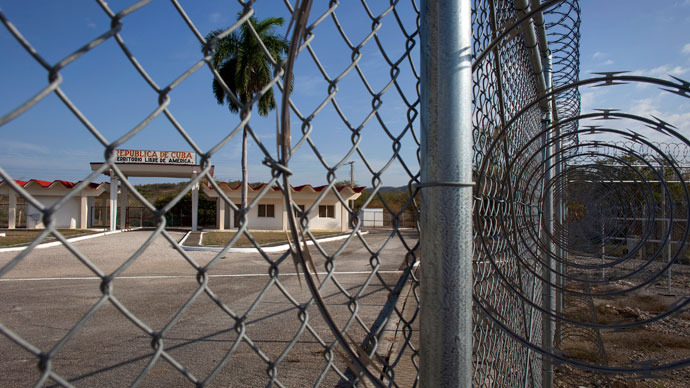Ask the United States why the prison facility at Guantanamo Bay, Cuba is still open, and you’ll see only irrational answers and fear in return.
Ask someone with an obsessive-compulsive disorder (OCD) about
his or her often bizarre and inexplicable habits – like not walking
on cracks, endlessly washing their hands, and counting things over
and over again – and they’ll have trouble explaining exactly why
they do it.
That’s because OCD is a mental disorder. From the US National Institute of Mental Health:“People with obsessive-compulsive disorder (OCD) have persistent, upsetting thoughts (obsessions) and use rituals (compulsions) to control the anxiety these thoughts produce. Most of the time, the rituals end up controlling them.
The International OCD Foundation notes,“If you have OCD, the warning system in your brain is not working correctly. Your brain is telling you that you are in danger when you are not.”
Sufferers genuinely believe that, for example, if they don’t
keep their books organized in a very specific way, then something
terrible might happen to them or their family. It makes no sense,
but they still do it, again and again and again.
They don’t understand that the danger is not real.
Now ask the United States why the prison facility at Guantanamo Bay, Cuba is still open. You’ll get the same fidgeting, the same irrational answers, and most importantly, the same fear. America also doesn’t understand that the danger is not real.
As Bloomberg Businessweek pointed out:
“Of the 150,000 murders in the U.S. between 9/11 and the end of 2010, Islamic extremism accounted for fewer than three dozen. Since 2000, the chance that a resident of the U.S. would die in a terrorist attack was one in 3.5 million, according to John Mueller of Ohio State University,and Mark Stewart of the University of Newcastle. In fact, extremist Islamic terrorism resulted in just 200 to 400 deaths worldwide outside the war zones of Afghanistan and Iraq—the same number, Mueller noted in a 2011 report (PDF), as die in bathtubs in the U.S. alone each year.”
In other words, Gitmo serves a better purpose keeping us safe
from the bathtubs that are installed there than the so-called
terrorists imprisoned there.
But, out of fear, we tell ourselves that as long as we have that prison down in Guantanamo Bay, Cuba, then the “terrorists” are down there, in cages, unable to plot against us. We get some peace of mind; we can sleep easier. Gitmo open = family safe.
And then we don’t think about it. But, as soon as there’s talk
about closing Gitmo, then all our wild delusions of fear well up
inside. Members of Congress are outraged!
For example, when President Obama’s first attempt to close the facility in May of 2009 was rebuffed by the Senate, which voted 90-6 to block $80 million in funding to close Gitmo, Senator John Thune (R-SD) made the argument, “The American people don't want these men walking the streets of America's neighborhoods.” He added, “The American people don't want these detainees held at a military base or federal prison in their backyard, either."
Later, in 2011, Senate Republicans attempted to pass legislation to codify Gitmo as the primary detention facility for future detainees. Senator Lindsey Graham (R-SC) said, “Whatever image problems that linger around Guantanamo Bay pale in comparison to the risk of not having a prison.”
Graham’s comments came one month after Wikileaks revealed the truth about Gitmo. In releasing 700 secret government documents on hundreds of Gitmo detainees, in April 2011, Wikileaks gave us Americans some much-needed therapy about our Gitmo compulsion. We were told that Gitmo isn’t necessary to keep us safe.
It’s true, of the 166 prisoners still at Gitmo, roughly 120 are considered “high risk.” Although, Wikileaks revealed that 160 “high risk” prisoners have already been transferred out of the facility to other countries or freed altogether.
Among a myriad of other problems with Gitmo, all can be found here, we also learned that many of those “terrorists” imprisoned at the facility were only there because they had the wrong wristwatch.
The Telegraph reported, “People wearing a certain model of Casio watch from the 1980s were seized by American forces in Afghanistan on suspicion of being terrorists, because the watches were used as timers by Al-Qaeda.”
Also, “At least…150 people are innocent Afghans or
Pakistanis, including farmers, chefs and drivers who were rounded
up or even sold to US forces and transferred across the world. In
the top-secret documents, senior US commanders conclude that in
dozens of cases there is ‘no reason recorded for
transfer.’”
And, to those who, like Senator John Thune, say Gitmo must
remain open because it’s too dangerous to hold these men in
facilities within the United States or try them in traditional
courts, consider this: Currently, there are 355 people convicted of terrorism charges
already being held in U.S. prisons. None have
escaped.
Osama Bin Laden’s son-in-law faced a judge in a courtroom in New
York City earlier this month to plead not guilty to terrorism
charges. And guess what? Not a single New Yorker was injured or put
in danger during the arraignment.
Gitmo does not keep some irrational danger at bay. In fact, just
like most OCD habits, it gets in the way of us living a normal,
healthy lifestyle. It’s the nation’s most expensive prison facility per capita, with
more than a million dollars spent annually on each inmate. It’s
also a foreign policy black eye on the United States that darkens
each year it stays open.
It’s the setting for torture, indefinite detention, military
tribunals censored from the media, and suicide (six inmates have
taken their own lives so far). As has been routinely said, the only
way out of Gitmo these days, tragically, is in a body bag. It’s
also been widely reported that Gitmo is used as a
terrorist recruiting tool abroad.
For these reasons, the international community has, time and time again, attempted to hold an intervention with us. The European Union, the United Nations Commission on Human Rights, Amnesty International, Human Rights Watch, and other organizations, governments, and activists around the world have called for the closure of Gitmo.
But, rather than taking the lead on this, the President enables
this irrational fear to continue. Bush and Cheney may have been the
trigger for it, but President Obama has cultivated it. He’s given
in to the national OCD. His promise on day one of his presidency to
close Gitmo has been the signature, unfulfilled promise of his
administration.
And today, nearly two years after the Wikileaks revelations,
four years after President Obama was first sworn in, and more than
a decade after the facility began housing prisoners of our endless
“War on Terror,” prospects for closing Gitmo have never been
dimmer.
At the start of 2013, the State Department office created in 2009 to specifically handle the closure of Gitmo was shut down. The special envoy in charge, Daniel Fried, was reassigned. His position will be left vacant.
In the President’s State of the Union Address in February, there
was no mention of Gitmo at all. Prisoners at Gitmo actually watched
the address, hoping for some nugget of sanity to emerge regarding
their fate.
Marine Corps General John Kelly told the House Armed Services Committee about the Gitmo inmates’ reactions to the speech, “They had great optimism that Guantanamo would be closed. They were devastated apparently ... when the President backed off, at least [that's] their perception, of closing the facility."
Today, many of those prisoners are on a hunger strike. This week, the military confirmed that the number of detainees on a hunger strike has more than tripled from 7 to 25. Attorneys for the inmates claim, “Over two dozen men have lost consciousness.” Eight of them are now being force-fed through a feeding tube in their stomach. Apparently, that one option of leaving Gitmo in a body bag has now been taken off the table.
Yet, reports just this week indicate that the Pentagon is considering a $150 million renovation of the prison camp. As though an upgrade of the dining hall will ease the concerns of hunger-striking inmates suffering from racist and Kafkaesque incarceration.
On top of that, the American people still overwhelmingly support continuing our compulsive behavior of keeping Gitmo open. A 2012 Washington Post/ABC News poll showed 70% of American support keeping Gitmo open, including more than half of “liberal Democrats” and two-thirds of “moderate Democrats.”
We just can’t shake the fear.
And so, Gitmo just sits there, mostly emptied. It’s held nearly 800 inmates. There were only 242 left when President Obama took office. And today, it’s down to 166 souls, trapped. Of that, 86 have been approved for release, but are barred from leaving. Plus, 25 are on a hunger strike.
The President, who will be a lame duck in two years, is focused
on the economy, immigration and gun control. There’s no time to
talk about Gitmo anymore.
It will stay open indefinitely, giving us “peace of mind” as we
continue our “war on terror” descent into national madness.
The statements, views and opinions expressed in this column are solely those of the author and do not necessarily represent those of RT.
The statements, views and opinions expressed in this column are solely those of the author and do not necessarily represent those of RT.


